Exotics Test #2
1/62
Earn XP
Description and Tags
Units #3-4 (pg 40-51)
Name | Mastery | Learn | Test | Matching | Spaced |
|---|
No study sessions yet.
63 Terms
MICE QUESTIONS
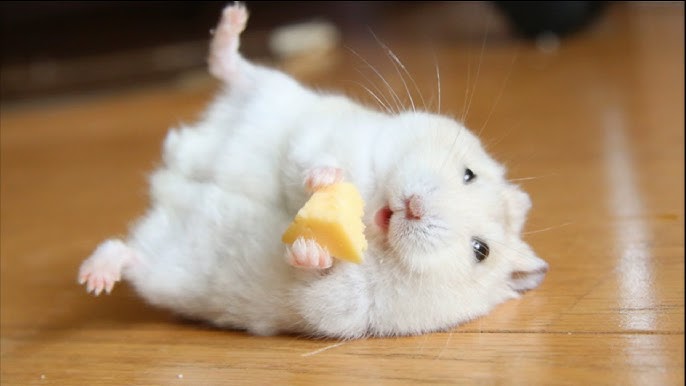
what are the three housing options for mice?
shoebox caging
metabolic caging
micro isolation caging
true of false? Housing female mice in pairs or groups is allowed but male mice not of the same litter need to be housed separately to avoid fighting and lower stress
true
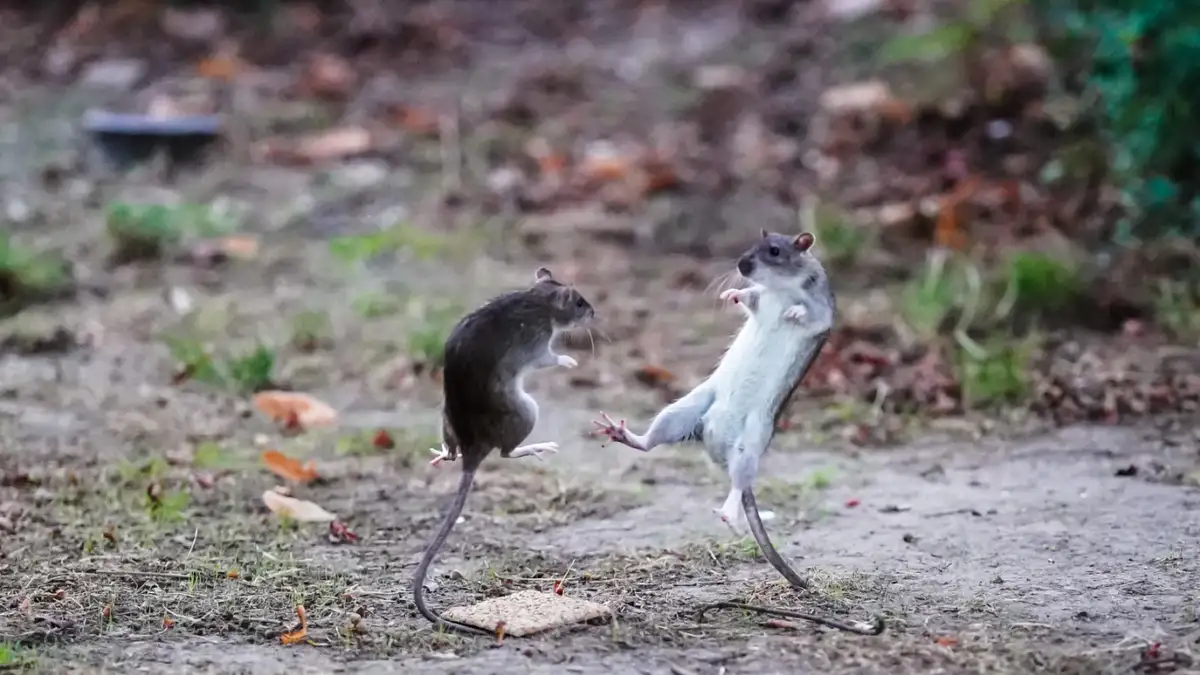
fill in the blanks
______________ is a dominance behaviour where the dominant mouse pulls the hair from the other mice in the cage. ___________ of these animals should occur to avoid this progressing into fighting.
barbering
separation
note: to determine which one gets removed from the group look for the one that looks the most intact (has most of the hair & is likely the bitch bully)
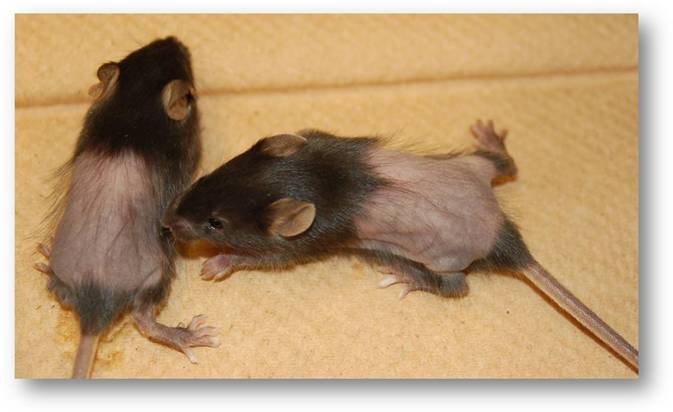
what type of cage is used to accurately monitor food consumption and waste production of an animal?
metabolic cages
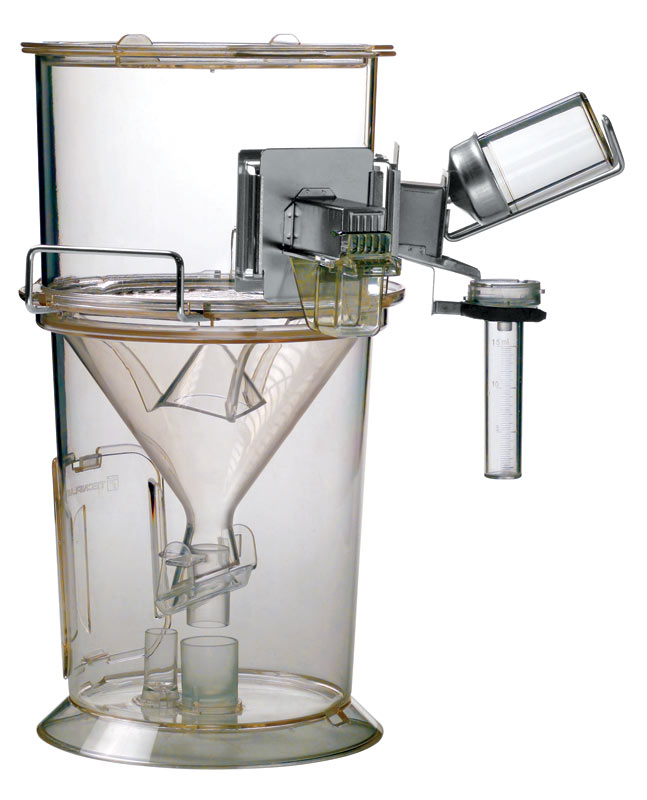
what type of cage prevents pathogens from entering or exiting the cage in a barrier facility?
micro Isolation cages
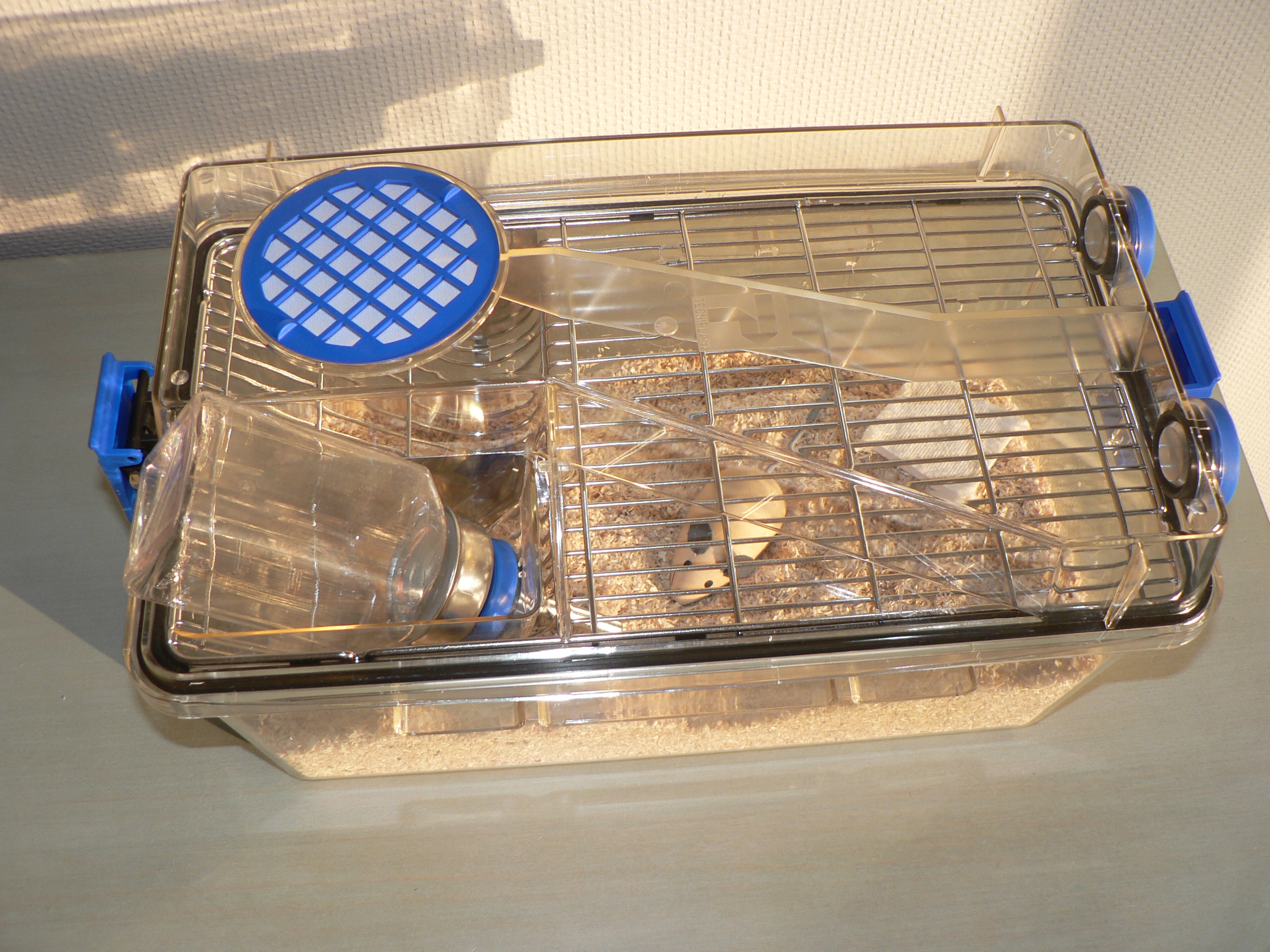
true or false? To get a hold of a mouse, grip the tail at the tip and lift it out of the cage
false, grip the tail about midway down its length and lift it out of the cage
fill in the blanks
enough ________ __________ must be gripped otherwise the mouse can twist its head and __________. Therefore if you fail to take enough at the first attempt then ____________________________________.
loose skin
bite
put the mouse back and start again
note: trick is always to let the mouse grip into something such as a metal cage, sleeve, etc as it’ll allow you to adjust and get a good grip.
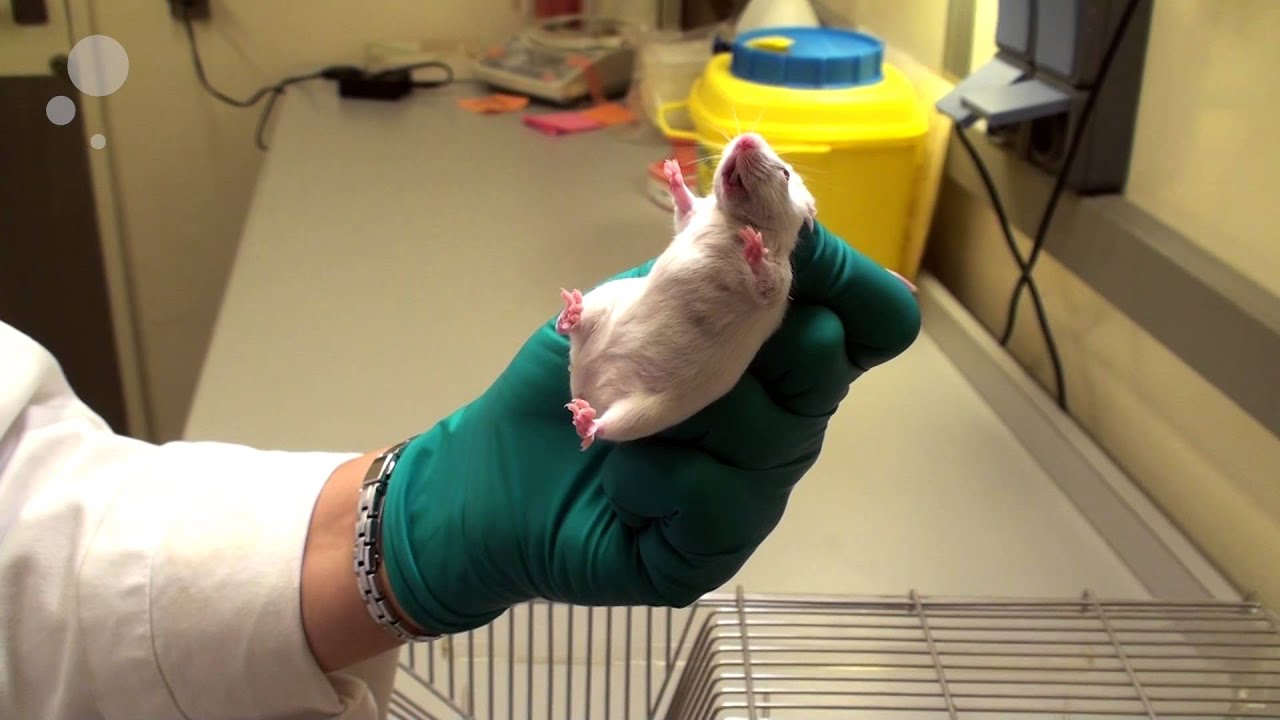
fill in the blanks
mice are sexed by comparing the ___-__________ _____________.
This is always _________ in males than females.
ano-genital distance
greater
note: to remember which sex has the longer distance remember you need room for the testicles therefore male mice have the longer ago-genital distance.

true of false? it is easier to tell the sex of mice when they are 2 weeks old rather than newborns.
False, it is easier to tell the sex of a newborn mouse than one that is 2+ weeks old because they haven’t developed yet making it easier to measure the ano-genital distance
what is the most convenient site for SQ injection in mice and how do you perform this injection?
lumbar area
insert needle under skin (caudal to cranial) slightly lateral to the spine so you don't hit it
note: SQ can be given anywhere but near the tail is the best
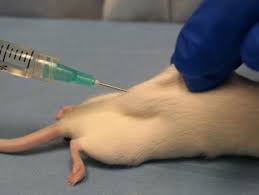
DON’T BE A ____________ (Tallon’s inside joke)
Melissa
note: don’t so a SQ injection directly overtop of the spine and almost wipe out an entire species
fill in the blank
up to ____ ml(s) may be injected SQ in mice.
1ml
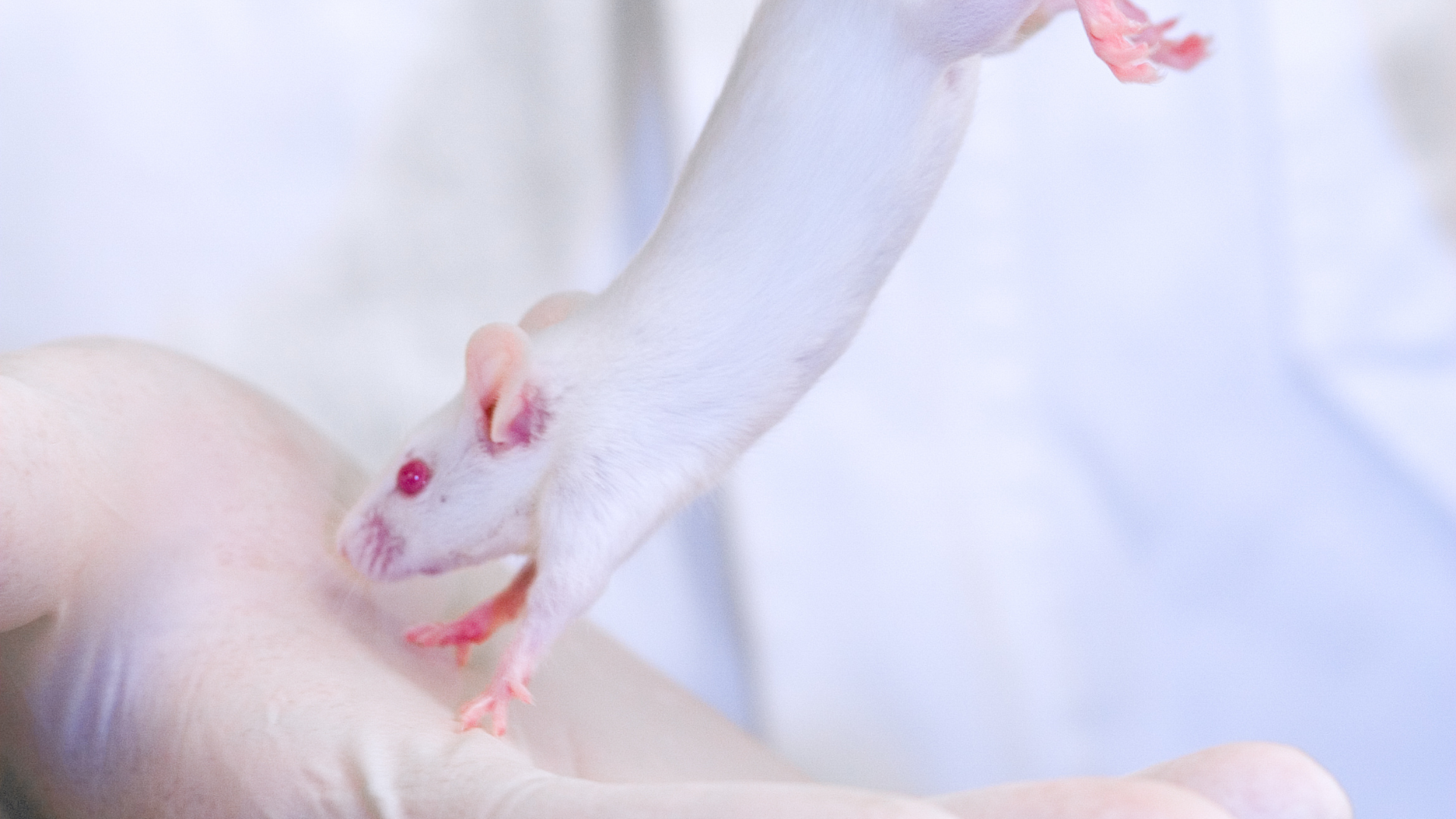
when giving a IP injection in mice why is the head lower than the hind legs?
so that the abdominal organs fall away from the injection site
fill in the blanks
when giving an IP injection to mice insert the needle just off the __________, halfway between the ________________ and the __________________________. Aim toward the ___________ of the abdomen, use a quick poke to pass the _________, and advance only __ mm.
midline
caudal end of the sternum
cranial aspect of the pelvis
center
muscle
2–3

fill in the blanks
when doing IV injections in mice the tail may be warmed with a __________, but _____ breeds are sensitive to __________ so be cautious. always inject in the __________ vein, not __________ arteries.
heat lamp
Albino
light
lateral (parallel)
dorsal/ventral
note: you warm the tail to dilate (open) the veins and improve blood flow, making IV access easier and safer as well as allowing you to find and enter the vein correctly
true or false? the correct site for IV injections in mice is the dorsal tail artery
false, IV injections in ice are given in the lateral tail vein.
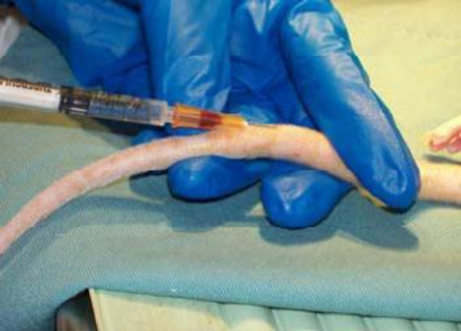
multiple choice
which of the following indicates an injection has missed the vein?
a) rapid blood return
b) no resistance to injection
c) white swelling around site
d) tail turns pink
C white swelling around the site
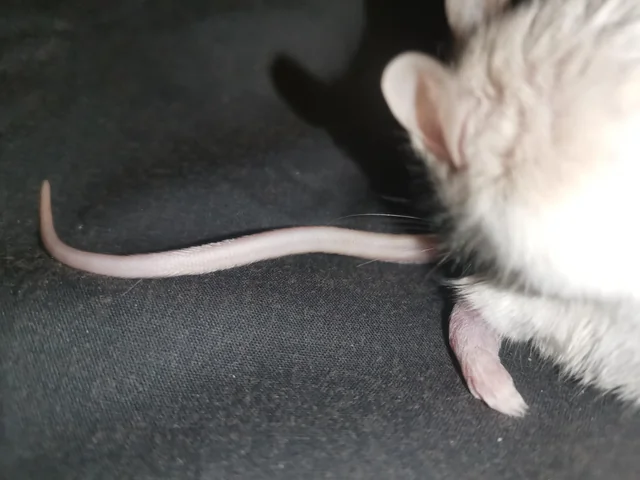
true or false? subsequent (additional) injections should move caudally after the first injection
false, always start low on the vein and work up so that if the first attempt is a fail you can still try again
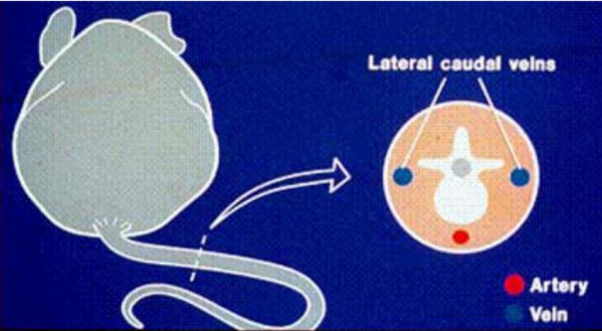
true or false? An oral gavage (stomach tube) is sharp for easier insertion and a cough reflex means you are in the esophagus
false, An oral gavage (stomach tube) is blunt and a cough reflex means your in the trachea which is BAD
what is the length and diameter of rodent gavages and what type of tip do they have?
10cm long
1-2mm diameter
blunt tip
note: the gavage will be inserted STRAIGHT from the nose to the xiphoid process (don’t go past) right where the stomach is located.
what is the maximum fluid volume that can be given to a mouse by gavage? approx how long should a mouse be fasted before gavage to allow for a slightly larger volume of fluids?
1ml
12hr
why would you gavage a mice?
if they are not eating
giving medication
accurate dosage for testing
in mice what vein is used for blood collection?
saphenous vein
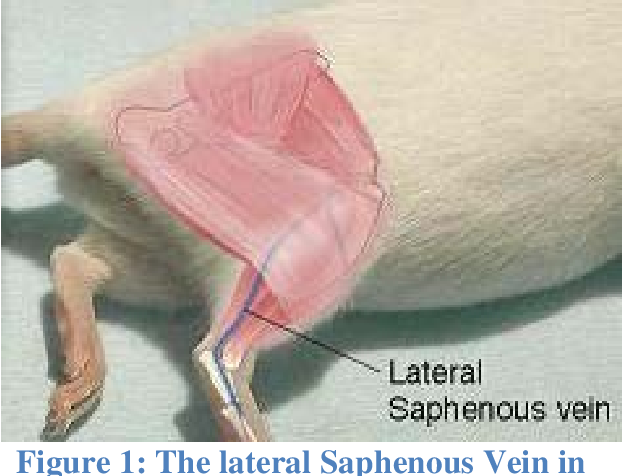
what are the 3 steps involved when collecting blood in mice?
restrain mouse (use 2cm diameter tub or commercial restraining device)
shave area & poke needle in vein (lengthwise to avoid severing the vessel)
collect blood in hematocrit tube (used for PCVs, smears, etc)
note: if you are taking blood again that day there no need to poke them again, just take a cotton pad and remove the scab then collect the blood.
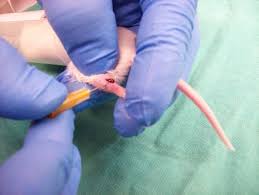
when performing a IC puncture on a mouse how much blood can be collected. what is this procedure considered? Large or small needle?
1-2ml
terminal procedure (anesthesia is mandatory)
larger needle to avoid destroying fibrinogen so that blood can clot for serum analysis
true or false? the longer a mouses heart is pumping the larger amount of blood you’ll get.
true, once IC puncture occurs massage chest to increase venous return so you get the most blood
what is the blood collection method in mice that can be done no more than once per week, up to twice per eye, with a maximum withdrawal of 1% of the animal’s body weight?
retro-orbital blood sampling
note: this is done because it gives you a larger vol of blood compared to saphenous vein.
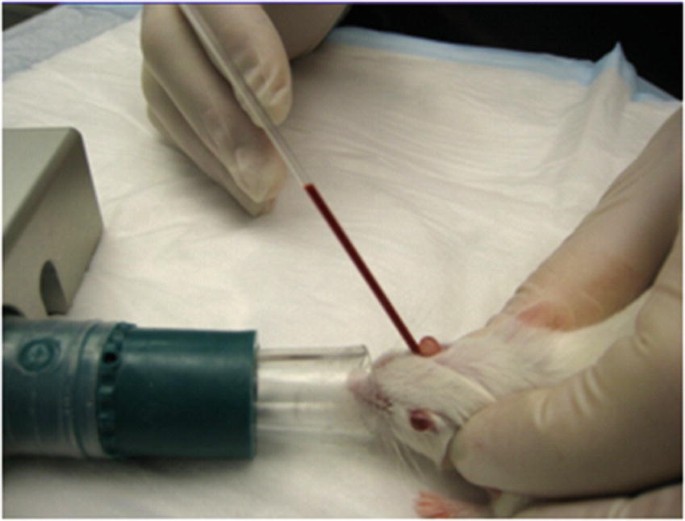
true or false? in retro-orbital blood sampling anesthesia is mandatory and this practice may be a terminal procedure but unlike IC puncture recovery is possible.
true
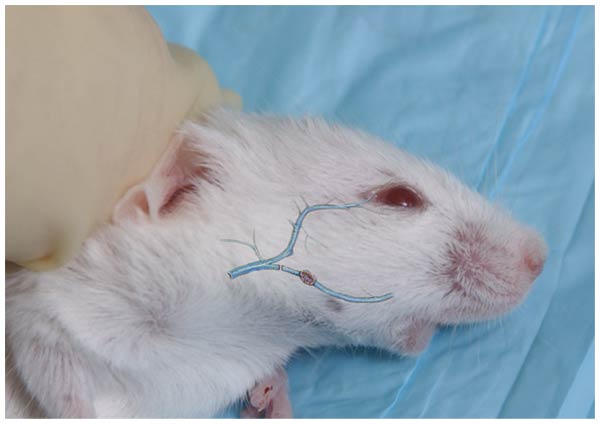
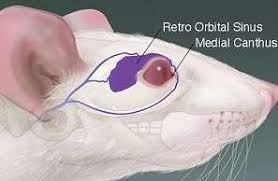
what are the steps of a retro-orbital blood sample collection?
anesthesia
micro-hematocrit capillary tube placed at medial canthus of eye under nictitating membrane
gently thrust tube past the eye
retro orbital sinus will get punctured
blood is collected
note: eye should remain uninjured and topical anesthesia is administered to reduce post procedural pain.

RAT QUESTIONS
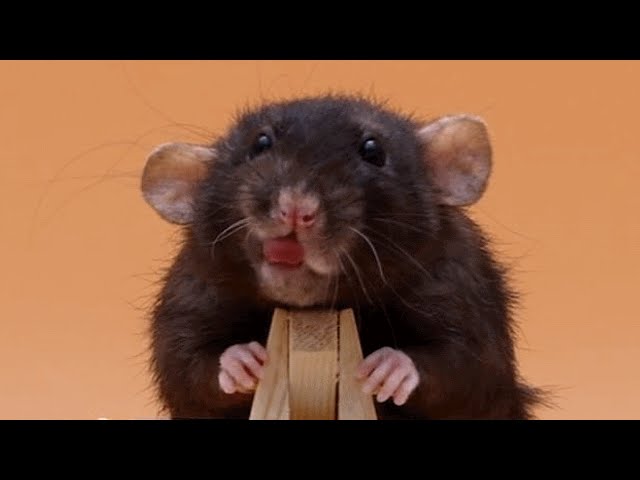
true or false? rats are housed in the same manner of mice but in larger cages with females in groups of 2-4 and mature males housed alone.
true, they have bigger cages, f are in groups of 2-4 and mature males are housed alone.
true or false? unlike in mice female rats have the greater ano-genital distance than male rats.
false, sex identification for rats is the same as mice
what is the difference between rats and mice when it comes to behaviour?
rats are more friendly and cooperative than mice as they only bite when over stressed and genuinely are friendly curious animals.
What two things can help when it comes to handling rats?
socialization and positive conditioning can greatly help in handling rats
fill in the blanks
stress in rats can be detected by the presence of __________ “red tears” secreted around the nostrils and eye by the _______ gland this is known as _____________________
porphyrin
harderian
chromodacryorrhea
note: porphyrin starts off as red dots appearing on the nose and progress into the red fluid coming out of the eye and or nose
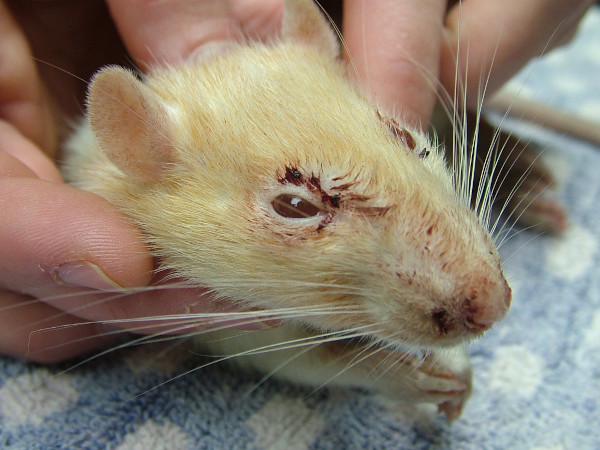
What does dried porphryin look like and when does it happen?
Dried porphyrin which has been groomed away from the rats face has a similar appearance to flea dirt and happens under chronic, physical or environmental stress
what are ways you can confirm the gavage tube is in the right place?
palpation of throat
inject small amount to see if there is a cough response
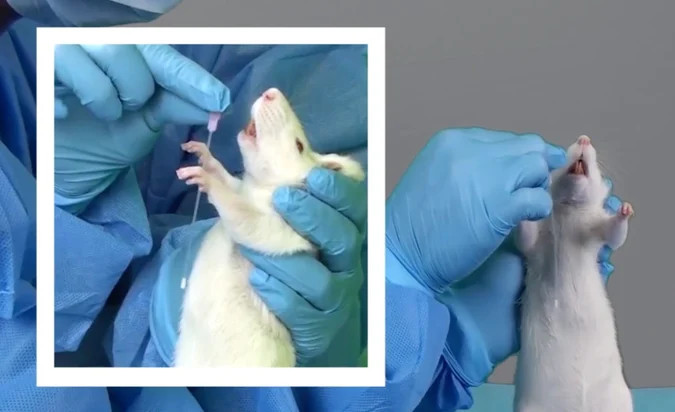
when removing a gavage tube what should you ALWAYS do? what should you apply to it before insertion?
pinch it so they don’t aspirate any fluid that may drip out of tube when being pulled out
apply lube
RABBIT QUESTIONS
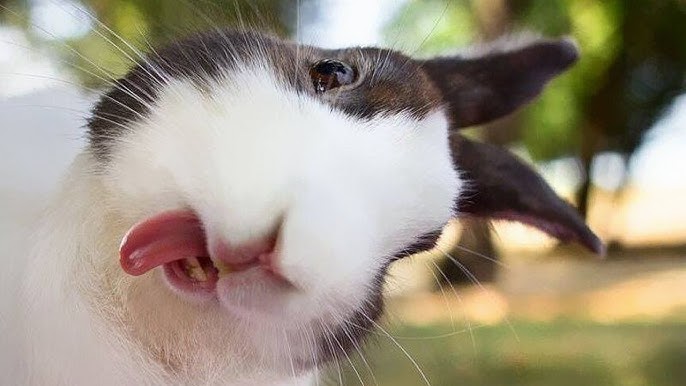
how are rabbits normally housed?
rabbits are housed individually shortly after weaning as fighting is common in both sexes even among litter mates.
they are grouped housed in large enclosures to assess their natural behaviours (encouraged whenever possible in compatible animals not just rabbits)
fill in the blank
rabbits are generally quiet and docile but they frighten easily because they are ___________ animals.
prey animals
how do you pick up/restrain a rabbit?
approach slowly
scruff neck and draw rabbit back towards you
NEVER LIFT FROM EARS
slide hand under belly and lift up
place thumb around each leg above the hock
tuck head under your arm (calms them)

fill in the blank
when returning a rabbit to its cage it must go in _____________
backwards to it doesn’t leap forward potentially injuring itself or the handler
note: easily attain spinal damage if not handled correctly
how do you tell the sex of a rabbit?
apply pressure in front of the genital opening. if male the penis is extruded but if female only a vulval sits visible
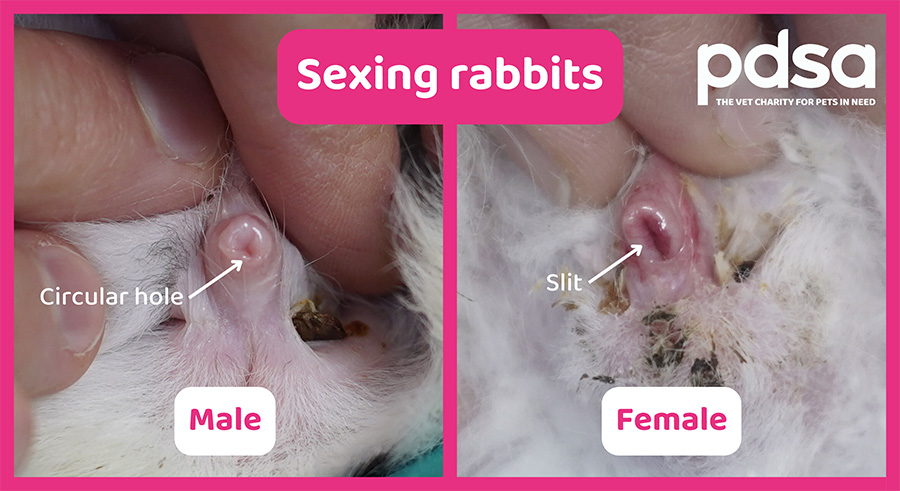
true or false?
testes are usually retracted in the male rabbit even when mature
true
how can you verify a stomach tube is in the right spot for a rabbit?
throat palpation
feeling no air exiting the tube on exhalation
how do you place a stomach tube in a rabbit?
estimate the length of the stomach tube before insertion
apply lube to the 2-4mm in diameter red rubber catheter (used as a stomach tube in rabbits)
place 1.5cm diameter gag in the mouth behind the incisor teeth
note: a gag is used to prevent rabbit from biting stomach tube
insert red rubber catheter with gentle pressure until rabbits swallow reflex naturally kicks in
attach syringe to the tube and give solution slowly
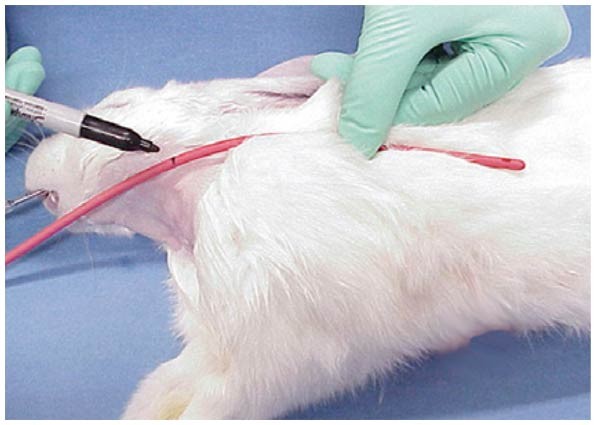
what vessel is used in rabbits to collect blood?
lateral ear vessel
note: shave or pluck the site and then cut the vein longitudinally for about 1mm using blood lancet or small scalpel blade.
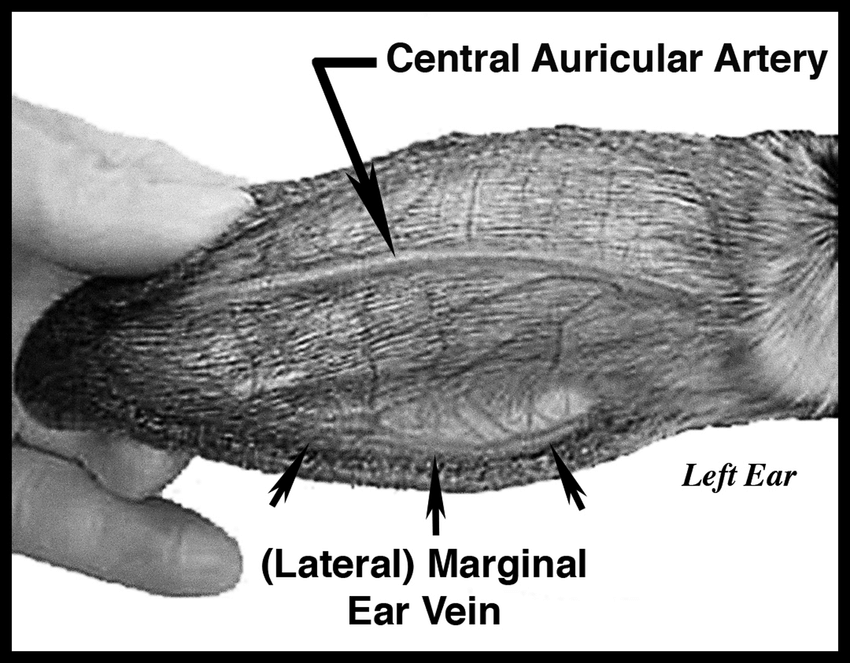
what is used to collect blood in rabbits?
capillary tube (drop)
needle & syringe (small volumes)
true or false? blood samples larger than 5mls may be collected using a needle and syringe in the central artery of the rabbits ear
false, blood samples >5mls may be collected using a vacutainer from the central artery of the rabbits ear.
note: insert needle with the bevel TO THE SIDE this prevents the arterial wall from occluding the opening to the needle
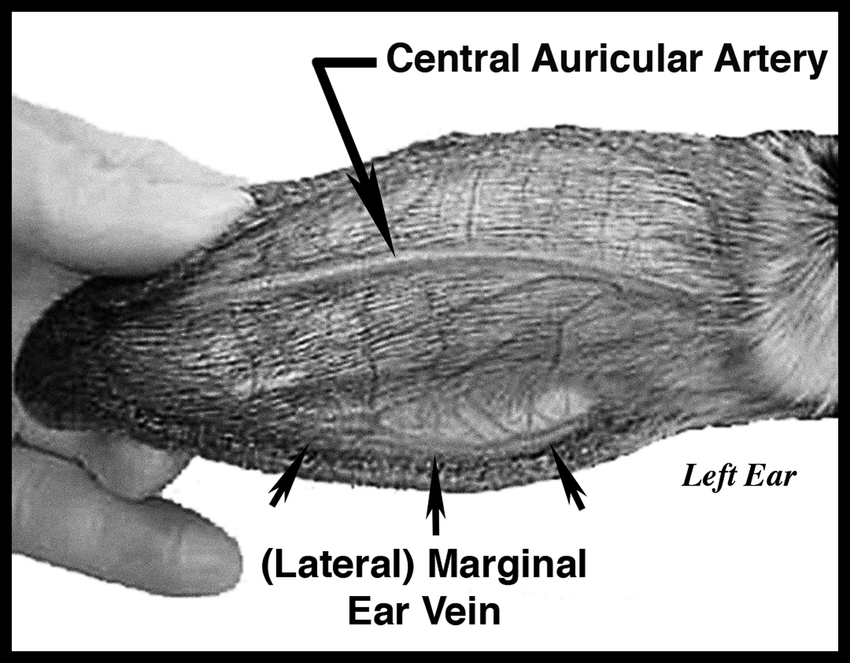
what do you know about rabbit SQ, IP and IV injections?
SQ: technique is same as cats and dogs
IP: advance needle no further than 1 cm into abdomen
IV: given in ear vein
true or false? after an IV injection in the ear vein either the restrainer applies pressure to the site or a paper clip can be used if done alone.
true, but don’t forget to remove the paperclip (placed halfway across the vein) after 1-2 minutes or it can stop circulation and cause damage
how do you collect blood from a rabbits ear vessels?
shave or pluck site
cut vein longitudinally for about 1mm using blood lancet or small scalpel blade)
collect blood
drop → capillary tube
small volumes → needle & syringe
>5mls → vacutainer (use central ear artery)
note: insert needle with bevel to the side to prevent the arterial wall from occluding the open needle
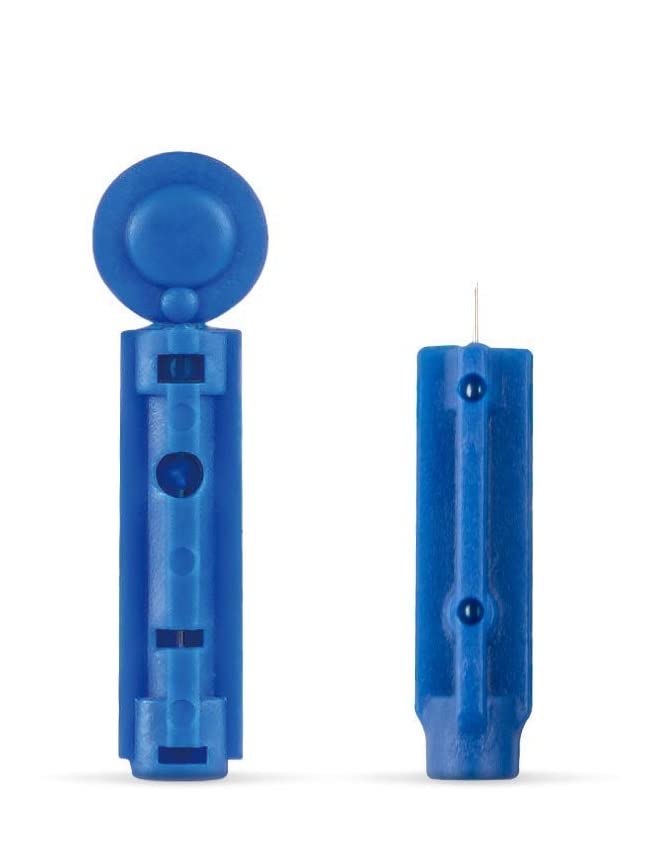
LABRATORY ANIMAL BREEDS
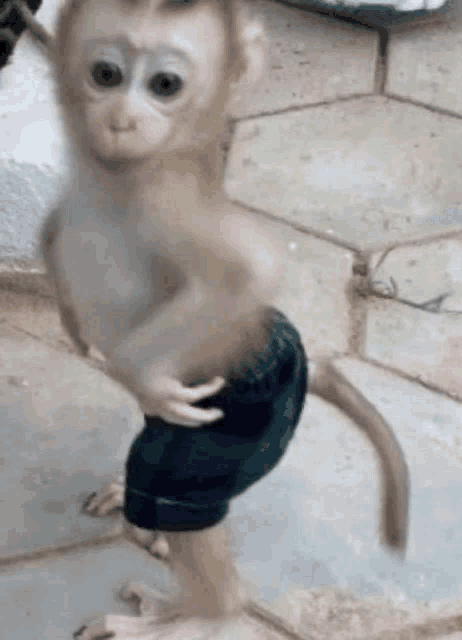
how are animal models selected for human medical research?
based on the similarity in physiology and anatomy to a human
example: pigs are omnivorous and have similar GI function to humans, therefore are commonly used for gastroenterology research.
what are the two legal ways to source research animals?
purpose bred animals
random source animals
fill in the blanks
_________________________ are born and raised under controlled contains and may be genetically manipulation. this is becoming more common as researchers demand animals with particular genetic makeups.
purpose bred animals
fill in the blanks
___________ ___________ laboratories and ___________ laboratories are the largest source of purpose bred research animals in Canada and the US.
charles river
jackson
fill in the blanks
animals that are purchased from shelters, farms or breeders are considered _______________
random source animals
why are random sourced animals preferred to purpose bred animals in some cases?
cheaper since no genetic modifications or SPF were done plus not all species are available from reach breeding facility like sheep.
true or false? random sourced animals do not have to be legitimately/legally acquired as outlined in the AUP
false they do have to be purchased legally and legitimately as outlined in the AUP
what 4 things must be considered when selecting the appropriate breed of laboratory animals?
litter size
life span
ease of handling
genetic modification availability